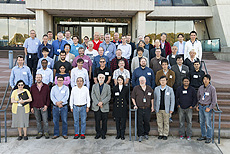Fermilab hosts international workshop on neutrino beams
 |
| Fermilab recently hosted scientists from all over the world for a workshop on neutrino beams and instrumentation. Photo: Reidar Hahn |
From Sept. 23-26, Fermilab hosted the Ninth International Workshop on Neutrino Beams and Instrumentation (NBI 2014). Fermilab's Alberto Marchionni, neutrino physicist in the Accelerator Division, and Bob Zwaska, accelerator physicist in the Accelerator Physics Center, co-chaired NBI 2014. Marchionni and Zwaska said the conference was a big success, with discussions chiefly concerning target materials, facility designs with increased neutrino beam power, safety and international cooperation — all with a heavy focus on long-baseline experiments.
The workshop series was initiated in 1999 when Japanese scientists, who had just started their neutrino beam for the world's first long-baseline experiment, sought international input. Participants from other countries understood the value of the workshop and supported its continuation.
"When you start designing a beamline, you present at this gathering," Marchionni said.
He provided an example of earlier NBI discussions on Fermilab's NuMI neutrino beamline informing the subsequent J-PARC (Japan Proton Accelerator Research Complex) neutrino beamline design.
Zwaska added that the workshop is especially relevant to Fermilab.
"Whether with neutrino oscillation experiments — the long-baseline ones, the short-baseline ones — or scattering experiments, neutrino experimentation is central to what Fermilab does," Zwaska said. "The exchange of information at the workshop is the most efficient way to enhance our skills to conduct these experiments and build neutrino beamlines. There is no book for how to make these beams."
A good part of NBI 2014 focused on operations, including safety. Zwaska said that, just like other scientific operations, neutrino beam facilities age, and that access, upkeep and repair of critical components of neutrino beamline systems was an important focus at the workshop.
Participants also discussed the near- and long-term future, in which beamlines will operate at higher power levels and eventually at megawatt intensities, as in the case of the proposed Long-Baseline Neutrino Facility being developed at Fermilab.
"We are ready to face the challenge in 2015, when we have to go significantly beyond the power we achieved with NuMI this past year of 360 kilowatts," Marchionni said, referring to recent improvements to the Fermilab accelerator complex. This will be very auspicious for particle physics, he explained, because Fermilab's NOvA experiment, matched with data from the other neutrino experiments, will begin to address pressing questions about our universe, such as its matter-antimatter imbalance.
Like previous NBIs, the importance of international cooperation was underscored at the workshop. Marchionni said international cooperation will be even more important for the higher power operations of the future.
"The neutrino beam is really a part of the physics of the experiment," Marchionni said. "In part, because of differing viewpoints like those you find at NBIs, you come up with the best solutions in experiments that have international participation. The same is true for the neutrino beam."
The next NBI workshop will take place in Japan in 2016.
—Rich Blaustein
|